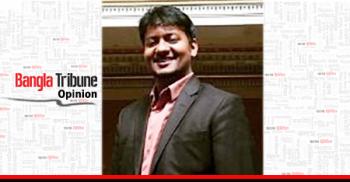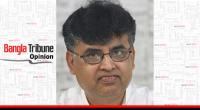 October in Sydney brings with it a certain warmth that reminds me of Hemanta (late Autumn) in Dhaka. For an immigrant like myself, who has spent more than three decades in Bangladesh and made the journey relatively recently, simple signs like this invoke fond memories.
October in Sydney brings with it a certain warmth that reminds me of Hemanta (late Autumn) in Dhaka. For an immigrant like myself, who has spent more than three decades in Bangladesh and made the journey relatively recently, simple signs like this invoke fond memories.
However, the signs of getting comfortable with my new life in ‘western society’ make me wonder whether the next generation will hold on to the values and identity which their parents have believed to be sacrosanct.
My curious mind wanted some answers and insights. So, one evening I decided to meet with a group of four young men who grew up in Australia (and are all in their 20s) but have South Asian parents. Speaking outside their gym in one of the south-western suburbs of Sydney, I could sense a strong sense of clarity in them.
Tanvir has been to Bangladesh three times and acknowledges the parents’ desire to preserve the Bengali culture. ‘In all the Bangladeshi events, be it PohelaBoishakh or Eid, you will find the children respecting the culture and wearing desi clothes. But that’s the maximum. Most of them can understand and speak Bangla, but don’t know how to read or write’’, he says.
‘In my desi friend circle, they don’t really know much about domestic Bangladeshi issues. What do I know? Climate change and the hot topic of Rohingyas are in my radar.’
He further adds, ‘Our parents smother us with their affection; they are afraid for us to explore the outside. All of my friends have heard the phrase ‘amader man shomman noshto hoye jabey’ (our reputation will be in tatters).’
Vinodan classifies himself as Sri Lankan Tamil who was born in Australia. His parents came in the 80s and according to him, unlike most of his friends, he is very interested in his motherland.
‘As a child, I wasn’t so interested but later in life in realised I lost a lot of my culture and wanted to get deeply involved in understanding the history. I feel the 2nd generation South Asians tend to be confused. You won’t really find one that’s the same as other.’
He also agrees that parents ‘stifle us with love’ but has a different take on it.
‘If you go against that force of love, you lose a lot of the benefits and the power of the culture we come from. My father and I are very close. We support the same team in the rugby league. I realised embracing love is more natural instead of pushing it back.’
Tanvir further adds, ‘The most common way of identifying is ‘picking and choosing’. You won’t find one individual the following everything correctly. It’s picking and choosing which is applicable to that person.’
Paras comes from Punjab in India and is not interested in what’s happening back home. ‘I may go and visit for a couple of weeks, but it won’t be for too long. In future I see myself going there to do business only’, he says.
He also thinks the kids here spend their young adulthood to be what their parents want to be, but in the white community, it’s different. Sinan, whose parents are from Bangladesh, has a different view. ‘We can’t compare the two. For a period of time, 99 percent of my mates and colleagues were all white. There are a lot of strains in the white community that we don’t feel’.
Speaking about identity and values, Sinan believes some traditional values should be kept, but we should also migrate those to a modern setting.
‘Completely forgoing traditional values to embrace a new liberal mindset is not the right way to go for the upcoming generation. If you ask me, I’m from Australia and a pure Australian. But if you ask my ethnicity, I’m Bengali. You can’t change the colour of your skin and nor should you try to change it.’
The conversation could have lasted for hours, but it was time to call it a night and head back home. As I was coming back I could not help but contemplate the true meaning of ‘home’. I guess the famous American polymath, Oliver Wendell Holmes said it the best:
‘Where we love is home – home that our feet may leave, but not our hearts.’
A communications professional, Radef Anwar currently lives in Sydney, Australia.
 Opinion
Opinion
30833 hour(s) 49 minute(s) ago ;
Noon 12:43 ; Tuesday ; Apr 23, 2024
Losing grip to hold strong
Send
Radef Anwar
Published : 16:49, Nov 12, 2019 | Updated : 17:03, Nov 12, 2019
Published : 16:49, Nov 12, 2019 | Updated : 17:03, Nov 12, 2019
0 ...0 ...
/hb/
Topics: Top Stories
***The opinions, beliefs and viewpoints expressed in this article are those of the author and do not reflect the opinions and views of Bangla Tribune.
- KOICA donates medical supplies to BSMMU
- 5 more flights to take back British nationals to London
- Covid19: Rajarbagh, Mohammadpur worst affected
- Momen joins UN solidarity song over COVID-19 combat
- Covid-19: OIC to hold special meeting
- WFP begins food distribution in Cox’s Bazar
- WFP begins food distribution in Cox’s Bazar
- 290 return home to Australia
- Third charter flight for US citizens to return home
- Dhaka proposes to postpone D8 Summit
Unauthorized use of news, image, information, etc published by Bangla Tribune is punishable by copyright law. Appropriate legal steps will be taken by the management against any person or body that infringes those laws.
Bangla Tribune is one of the most revered online newspapers in Bangladesh, due to its reputation of neutral coverage and incisive analysis.
F R Tower, 8/C Panthapath, Shukrabad, Dhaka-1207 | Phone: 58151324; 58151326, Fax: 58151329 | Mob: 01730794527, 01730794528


